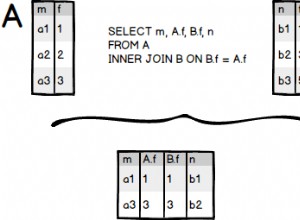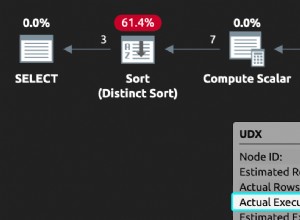Eu construí um teste que compara OFFSET, cursores e ROW_NUMBER(). Minha impressão de ROW_NUMBER(), que seria consistente em velocidade, independentemente de onde você esteja no conjunto de resultados, está correta. No entanto, essa velocidade é dramaticamente mais lenta do que OFFSET ou CURSOR, que, como também foi minha impressão, são praticamente os mesmos em velocidade, ambos degradando em velocidade à medida que se avança para o final do resultado.
Resultados:
offset(100,100): 0.016359
scroll(100,100): 0.018393
rownum(100,100): 15.535614
offset(100,480000): 1.761800
scroll(100,480000): 1.781913
rownum(100,480000): 15.158601
offset(100,999900): 3.670898
scroll(100,999900): 3.664517
rownum(100,999900): 14.581068
O script de teste usa sqlalchemy para configurar tabelas e 1.000.000 linhas de dados de teste. Em seguida, ele usa um cursor psycopg2 para executar cada instrução SELECT e buscar resultados com os três métodos diferentes.
from sqlalchemy import *
metadata = MetaData()
engine = create_engine('postgresql://scott:example@sqldat.com/test', echo=True)
t1 = Table('t1', metadata,
Column('id', Integer, primary_key=True),
Column('d1', String(50)),
Column('d2', String(50)),
Column('d3', String(50)),
Column('d4', String(50)),
Column('d5', String(50))
)
if not engine.has_table('t1'):
conn = engine.connect()
t1.create(conn)
# 1000000 rows
for i in range(100):
conn.execute(t1.insert(), [
dict(
('d%d' % col, "data data data %d %d" % (col, (i * 10000) + j))
for col in range(1, 6)
) for j in xrange(1, 10001)
])
import time
def timeit(fn, count, *args):
now = time.time()
for i in xrange(count):
fn(*args)
total = time.time() - now
print "%s(%s): %f" % (fn.__name__, ",".join(repr(x) for x in args), total)
# this is a raw psycopg2 connection.
conn = engine.raw_connection()
def offset(limit, offset):
cursor = conn.cursor()
cursor.execute("select * from t1 order by id limit %d offset %d" % (limit, offset))
cursor.fetchall()
cursor.close()
def rownum(limit, offset):
cursor = conn.cursor()
cursor.execute("select * from (select *, "
"row_number() over (order by id asc) as rownum from t1) as foo "
"where rownum>=%d and rownum<%d" % (offset, limit + offset))
cursor.fetchall()
cursor.close()
def scroll(limit, offset):
cursor = conn.cursor('foo')
cursor.execute("select * from t1 order by id")
cursor.scroll(offset)
cursor.fetchmany(limit)
cursor.close()
print
timeit(offset, 10, 100, 100)
timeit(scroll, 10, 100, 100)
timeit(rownum, 10, 100, 100)
print
timeit(offset, 10, 100, 480000)
timeit(scroll, 10, 100, 480000)
timeit(rownum, 10, 100, 480000)
print
timeit(offset, 10, 100, 999900)
timeit(scroll, 10, 100, 999900)
timeit(rownum, 10, 100, 999900)




